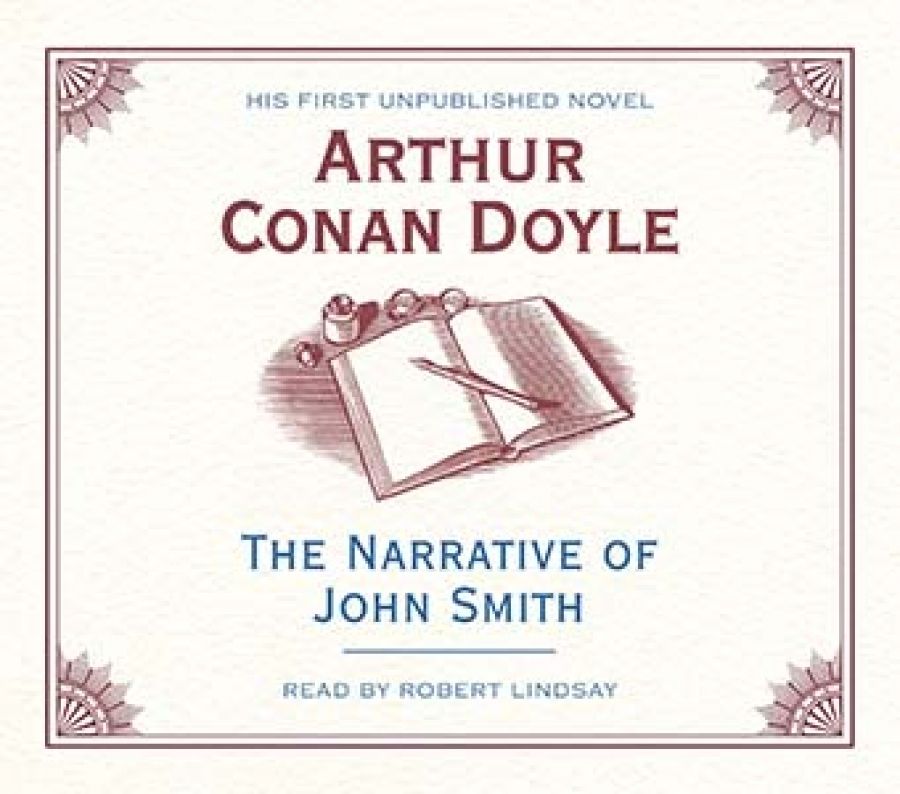
- Free Article: No
- Contents Category: Audio Book
- Review Article: Yes
- Article Title: Posthumous Holmes
- Online Only: No
- Custom Highlight Text:
A century later, the Conan Doyle/Sherlock Holmes industry shows no signs of abating. In recent months alone, there have been Anthony Horowitz’s The House of Silk, a new Holmes adventure, and the big, dumb action movie Sherlock Holmes: A Game of Shadows; a television series, Sherlock, set in the twenty-first century, appeared in 2010; and in 2005 Julian Barnes’s George and Arthur investigated the relationship between an unjustly accused solicitor, George Edalji, and Doyle who took up his cause.
- Book 1 Title: The Narrative of John Smith
- Book 1 Biblio: British Library Board, $39.95 5 CDs, 270 minutes
Now the British Library has issued Doyle’s first, hitherto unpublished (and unfinished) novel as an audio book. The Narrative of John Smith runs to five chapters and a fragment of the sixth. Doyle himself, somewhat improbably, attributed its non-appearance to a failure of the postal services: ‘The publishers never received it.’
It is superficially easy to see why it might not have been published in the 1880s. Despite the word ‘narrative’ in the title, it is really no more than ruminations on philosophical and/or contentious topics, interspersed with character sketches. It is also feasible that some of the views expressed, on religion for instance, might have made it seem a potentially seditious, or at least unpopular, prospect for late Victorian England.
But if the absence of intricately connected cause-and-effect or character-driven events doesn’t worry you too much, you may find much to enjoy in these ‘rambling notes of a week’s indisposition’, related with elegance and spiked with wit. Their genesis is in the wanderer Smith’s being confined to his sofa for a week after a diagnosis of ‘rheumatic gout’. A week indoors is anathema to Smith, but the doctor urges him to have ‘a literary gorge’: not just reading, but also testing the maxim that every human being can produce one good book.
The set-up in place, Smith allows his mind to canvass some large topics, and to come up with sage pronouncements such as ‘Elegance is simply comfort in its highest degree of development’, as he ponders aesthetic matters while taking in his modest lodging’s appointments. Or, following a chat with his doctor, he muses on how great achievers have too often been at the mercy of blowflies picking at their corpses in search of their single defect – such as Robert Burns’s sexual profligacy.
As his so-called ‘narrative’ gathers momentum, the topics get more controversial, offering the lie to his remark, ‘There is nothing so much I hate as idleness – except for labour.’ Admittedly, the labour is essentially intellectual as he takes on, say, the pomposities and dogmatism of religion as he sees them (recalling Doyle’s rejection of most tenets of organised religion), or when he considers the likely rearrangement of imperial hierarchies in the centuries ahead. Presciently, from a 2012 point of view, he anticipates that China (‘with its three hundred million people’) will be dominant, followed by the United States (if it can bridge the gulf between rich and poor), the British Empire (‘great area’, but lacking ‘homogeneity’), and with Russia coming in fourth. Not bad for 1883.
He takes enjoyable swipes at Royal Society ‘disquisitions’, publishers (though no amount of rejections can subdue the ‘impulse to write’), the smug vanities of scientists (‘our sapient friends’) with their way of making laypersons sound foolish or fossil, instead of investigating really large matters such as ‘why we sleep’, and statesmen, who might be less inclined to declare war had they ever seen any fighting.
All this is treated with engagingly worn erudition and argumentative flair, but perhaps the work’s most endearing aspect is how the characters who intermittently disturb Smith’s enforced seclusion emerge. These include the authoritative doctor who distinguishes between rheumatism (an accident) and gout (one’s own fault), and the brusque ex-major on the floor above, whose ‘health is never so good as when [he’s] in harness’, stressing the need to ‘keep the Russian bear in order’. There are women too: kind, over-taxed Mrs Rundle, the landlady, who administers a mustard poultice to Smith’s ankle when, as he says, a man would settle for brandy; and artistic Miss Oliver from the apartment opposite, whose visit to thank Smith for a commission leads to a nicely unexpected outcome.
Robert Lindsay, perhaps best known here for his role as the smart-alec dentist in the undeservedly long-running sitcom My Family, discriminates consistently and wittily among these characters. There is an element of tour de force as the actor must vivify the entire cast, and Lindsay rises admirably to the challenge. He ‘does’ Mrs Rundle (‘daily life has crushed all the soul out of her’) with unpatronising sympathy, and is very funny at the expense of the obsequious curate. When he is not talking to – or at – these people, he addresses his listeners with warmth and wit.
You don’t have to be Sherlock Holmes to know that this fragment will be seized on by Doyle’s devotees – possibly adding to their number.


Comments powered by CComment